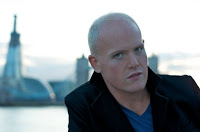 |
| Vaughan Williams |
Reviewed by Robert Hugill on Jun 11 2015
Star rating:
RVW's works for voice and strings in this climax to the London English Song Festival
 |
| William Vann |
 |
| Nicky Spence |
Describing voices is always difficult, with a great use of analogy. Nicky Spence's combination of beauty and firmness of tone with frankness of delivery, and superb diction, brought to mind voices like Anthony Rolf Johnson and particularly Philip Langridge, though of course Nicky Spence has his own very distinct personality. Throughout the concert he showed a great deal of engagement with the other musicians, giving the aura of chamber music rather than a song recital per se.
 |
| Benyounes Quartet |
RVW's Four Hymns date from 1912 to 1914, a period just after his Five Mystical Songs whose sound world the hymns share. Each movement set a hymn text from various periods and Nicky Spence gave the whole a strong sense of identification with the text. That the hymns counted and meant for something. Lord! Come Away! (Jeremiah Taylor 1613-1667) started with firm, vibrant tone and strong declamation, with a nicely robust piano before becoming more confiding. A haunting melody on the viola introduced Who is the fair one? (Isaac Watts 1674-1748) with a rather sinister piano accompaniment. Here the melodic and harmonic outlines really did recall the Five Mystical Songs, and the performers brought a sense of mystical passion to the piece. Come Love, come Lord (Richard Crashaw 1613-1649) started with a rather magical combination of viola and piano, then combining with the seductive beauty of the vocal line. Evening Hymn (Robert Bridges 1844-1930) had vigorous yet quiet instrumental contributions, and all concerned gave a strong sense of controlled intensity, of something being restrained and held in check. This was the second time that I had heard these pieces this week (the first being at Temple Music when Nicky Spence stood in at the last moment for Toby Spence) and I am puzzled that they are not more frequently done.
After the interval we started with a piece of relative rarity, RVW's 1906 Nocturne and Scherzo for string quintet. Here were flashes of the mature RVW combined with elements of Stanford and German Romanticism, as well as some strong counterpoint. The Scherzo used a folk-song, but handled in a way rather less imaginatively than in RVW's later music.
Finally we heard On Wenlock Edge the song cycle for tenor, string quartet and piano setting AE Housmann poems, and dating from 1909. It remains one of RVW's best known works and perhaps one of the most significant from his early period. On Wenlock Edge was fast and vibrant, with lots of atmospherics from piano and strings. Within all this Nicky Spence was firm and steady, and an admirable combination of vivid words and strong long. His tonal beauty in From far, from even and morning was combined with great intensity of meaning, and combined with refined instrumental playing. Nicky Spence brought a great sense of narrative to Is my team ploughing? with the two characters differentiated by tone of voice, but also different textures in the accompaniment, leading to gripping climax. Oh, when I was in love with you? was pure naughty charm, with some nice wry comments from the strings. Bredon Hill seemed to luxuriate in the lovely textures, but there was also an immediacy to Nicky Spence's story telling. Plenty of moment of magic led to a rapturous ending. Clun was easy flowing, with an appealing frankness from Nicky Spence complemented by some lovely subtle playing.
Having heard Nicky Spence performing two of the items earlier that week (see my article), it was fascinating to hear them again with a different set of instrumental performers and with Nicky Spence benefiting from greater rehearsal time and not last minute hustle. The results had all the immediacy of the early performances, but with a more considered feel to the vocal tone. Speeds in the concert never felt slow, quite the contrary, but overall timings were surprising. The music flowed at just the right rate. What I took away most was the vibrant immediacy of Nicky Spence's communication in song, and the lovely collegiate chamber music feel to all the performances.
The London English Song Festival was a notable achievement, especially for founder, artistic director, organiser and pianist William Vann. It was an opportunity to hear all of RVW's major songs, being able to put them into context, and this concert made a fitting climax.
Elsewhere on this blog:
- Sheer musical gorgeousness: The Sixteen on pilgrimage in Guerrero and Lobo - concert review
- Rediscovering Handel's inspiration: Gasparini's Il Bajazet - Recording of the Month
- Intriguing pairing: Vaughan Williams and James MacMillan oboe concertos - CD review
- Superb musical values: Cosi fan tutte at Garsington - opera review
- Warm and witty: Jonathan Dove's Flight at Holland Park - opera review
- Purity and beauty: Stile Antico at Spitalfields - concert review
- Vivid colours: Handel Israel in Egypt at Spitalfields Music Summer Festival - concert review
- Highly imaginative: Isis Ensemble, Jacques Cohen - CD review
- A triumph: Puccini's Il Trittico at Opera Holland Park - opera review
- Vibrant ensemble: Wolf-Ferrari's I gioielli della Madonna in Bratislava - Opera review
- East of Tallinn: Orient Music Festival - conference report
- Surrender: Ilona Domnich in an imaginative opera arias recital - CD review
- Home











No comments:
Post a Comment